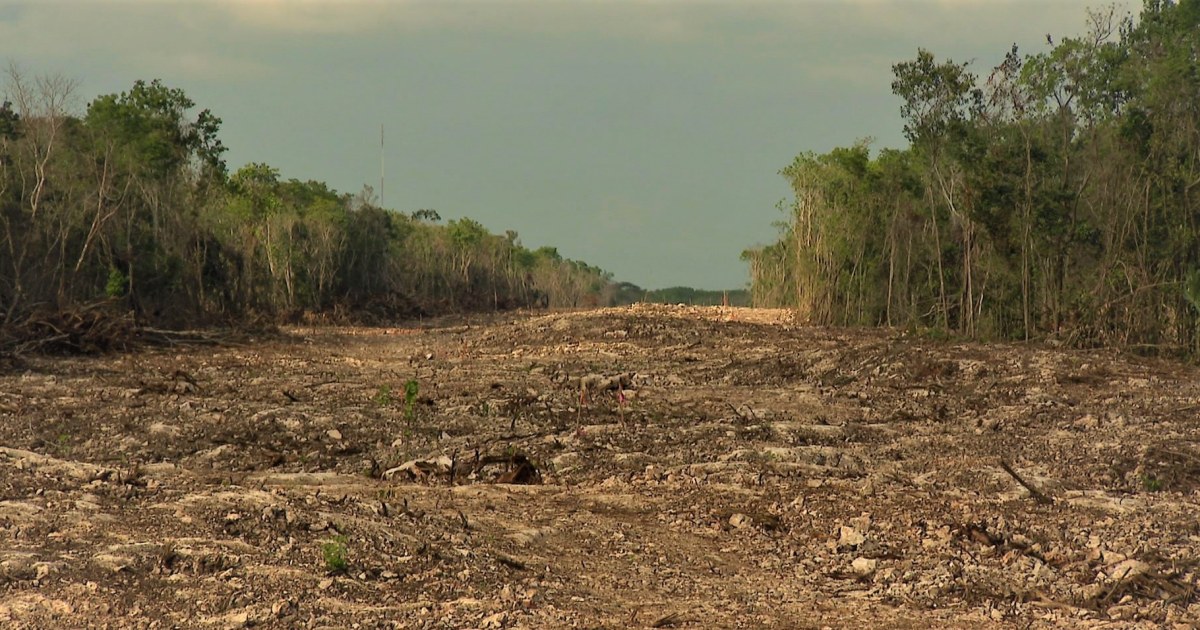Mexican environmentalists, Indigenous leaders denounce Mayan Train project
Companies, agencies, institutions, etc
NBCFollow
NBC NewsPLAYA DEL CARMEN
El Tren Maya
Yucatán
Sac Actún
Garra de Jaguar
the Tren Maya
the Supreme Court
Garra del Jaguar
Playa del Carmen’s
Jaguar Wildlife Center
the National Institute of Anthropology and History
Global Witness
Facebook
NBC UNIVERSAL
People
Andrés Manuel López Obrador
Quintana Roo —
Tania Ramírez
Yucatán
Raúl Padilla
Miguel Covarrubias Reyna
Quintana Roo's
Ignacio Pat Tzuc
David Reyes Rodríguez
Xalachó
Pedro Valle Centeno
Noticias Telemundo
Albinson Linares
Valeria León
Carmen Montiel
Groups
Mayans
Indigenous
Mexican
Latino
Physical locations
the Caribbean Sea
Yucatan
Indigenous Maya
Mother Earth
Places
the Mayan Train
Locations
Mexico
Tulum
Chiapas
Tabasco
Campeche
Playa del Carmen
Dama Blanca
Cancun
Xalachó
Instagram
Mexico City
Events
No matching tags

Summary
It's a territory where nature rules, a sacred place for the Mayans that is impregnated with archaeological remains and ancient traditions.Yet the freshness of the vegetation ends suddenly near Tulum, and the greenery opens up into an ocher and brown desert.The barren landscape has been carved by the Mayan Train project, or El Tren Maya, one of the flagship construction projects of the government of President Andrés Manuel López Obrador, who has described it as a comprehensive plan to “achieve the sustainable development of southeastern Mexico.” Upon completion, the railway will cover nearly 950 miles across the states of Chiapas, Tabasco, Campeche, Yucatán and Quintana Roo — where Playa del Carmen is located — after an investment of approximately $10 billion. She warned that continuing the construction is like "covering the veins of water, of the aquifer” and talked about how the entrance to a recently discovered cave, The Dama Blanca, had been blocked by rubble produced by the works.In 2020, during the project's first phase, the president said the new railway would help promote tourism, cargo transportation and generate some 100,000 new jobs. However, many of the communities along the Mayan Train route have spoken out against the project, citing the environmental impact it will have on the area.“We know that the places where it is going to pass are very fragile — they are going to have to put these cement piles inside the caves,” Ramírez said, alarmed at the prospect of some concrete structure breaking through the area’s delicate surface.A unique feature of the regions of Quintana Roo and Yucatán is that they are located on a large platform of chalky, limestone rocks that emerged millions of years ago from the Caribbean Sea. Also known as the Yucatan slab, this platform has few bodies of surface water but many underground rivers and cenotes, very deep water wells, which are one of the great tourist attractions in the area. “We are against how this stretch is being built and we are very concerned about how it is being done in general, due to the lack of [environmental] studies,” Ramírez said. We are at risk of losing the great Mayan aquifer." In addition to the effects on the environment, the Mayan Train has also been highly criticized for the damage it can cause to the archaeological structures, which usually occur when a work of this magnitude is undertaken.Earlier this month, the National Institute of Anthropology and History (Inah) announced that more than 25,000 archaeological monuments and other finds had been identified in the area, including 129 human burial sites —most with offerings— and 835 natural elements associated with caves and cenotes.Miguel Covarrubias Reyna is one of many archaeologists to raise concerns about building a railway in the middle of Quintana Roo's jungle, where archaeological settlements abound.
As said here by Albinson Linares, Valeria Le?n, Carmen Montiel, Noticias Telemundo